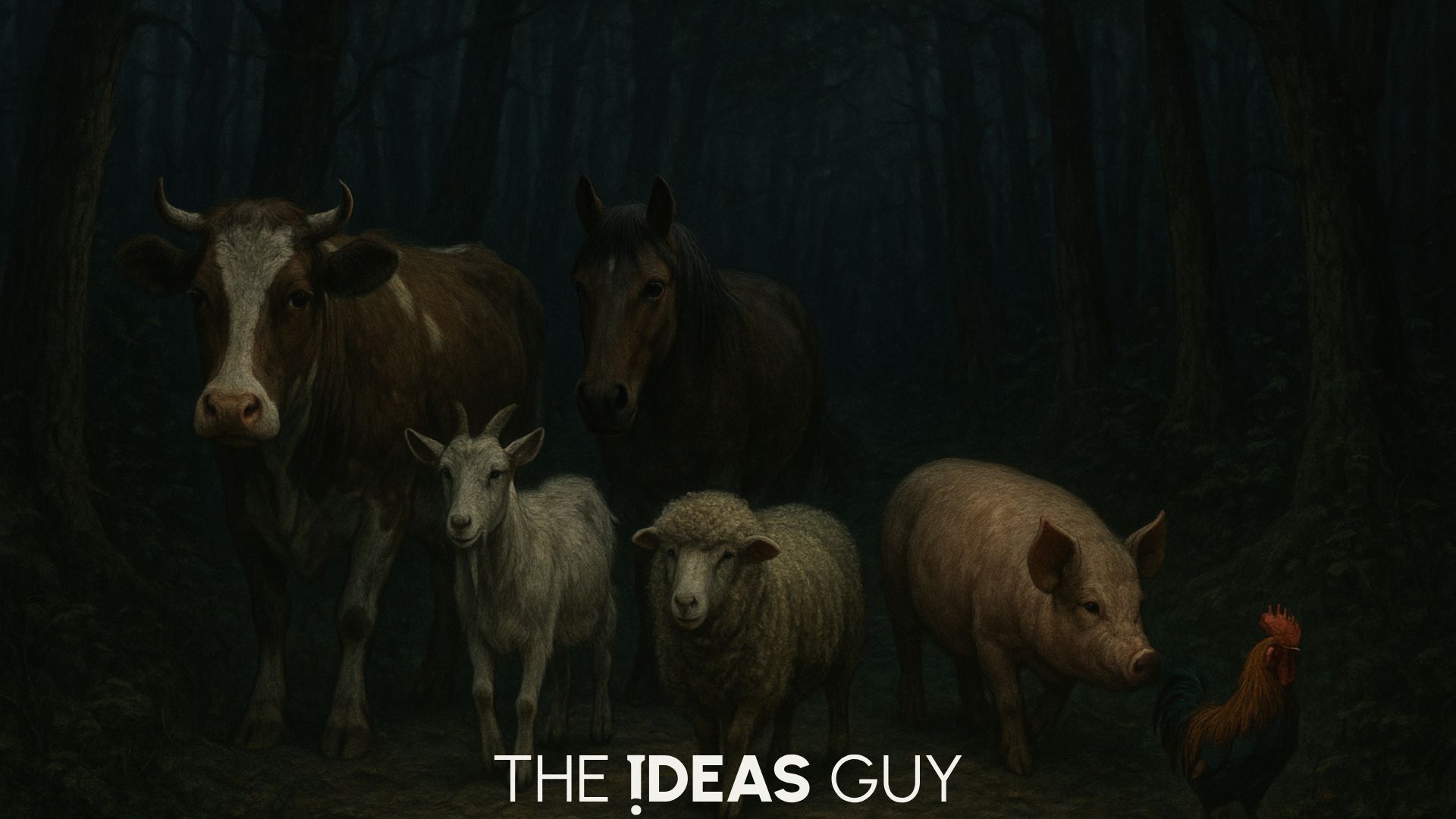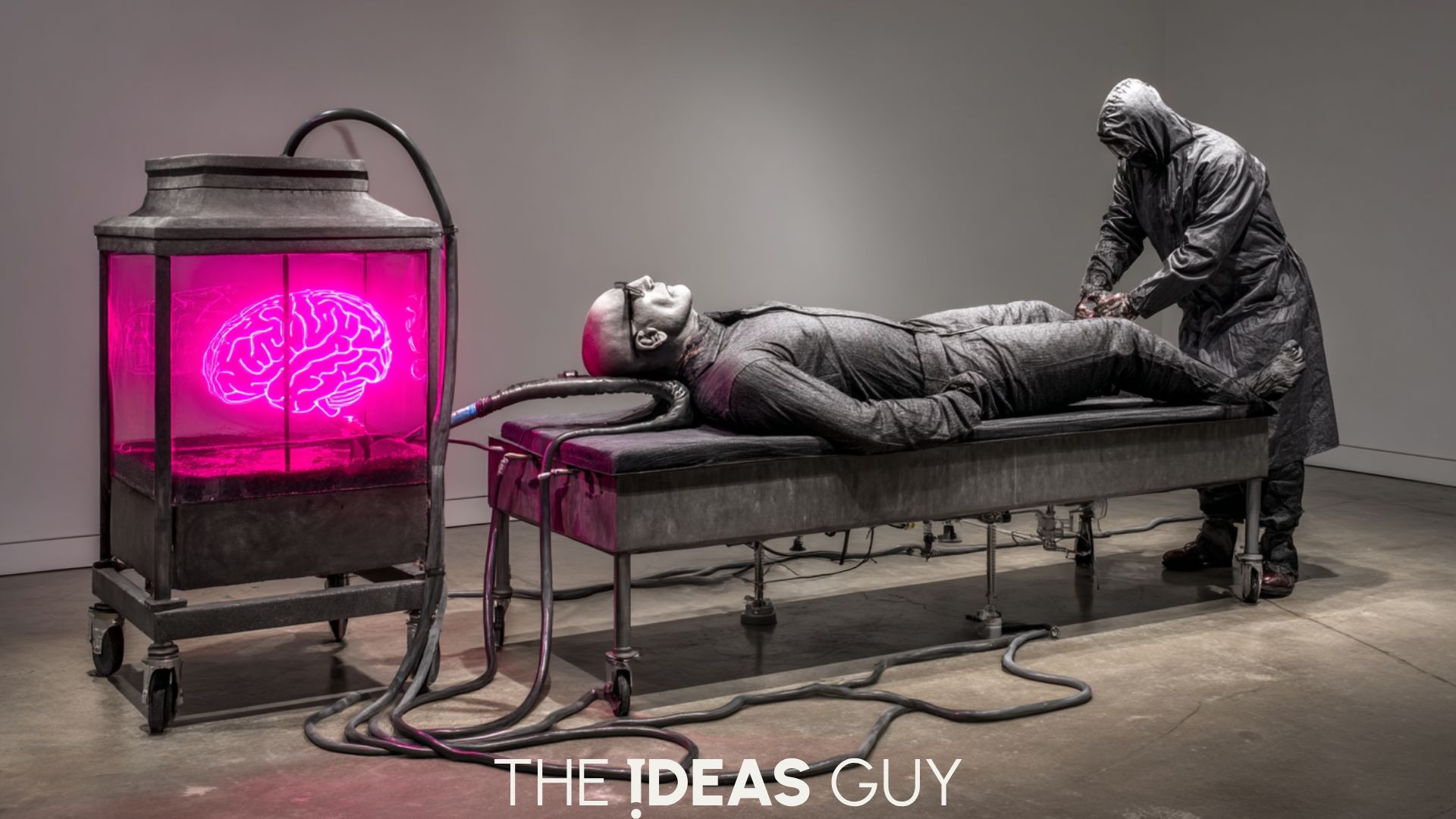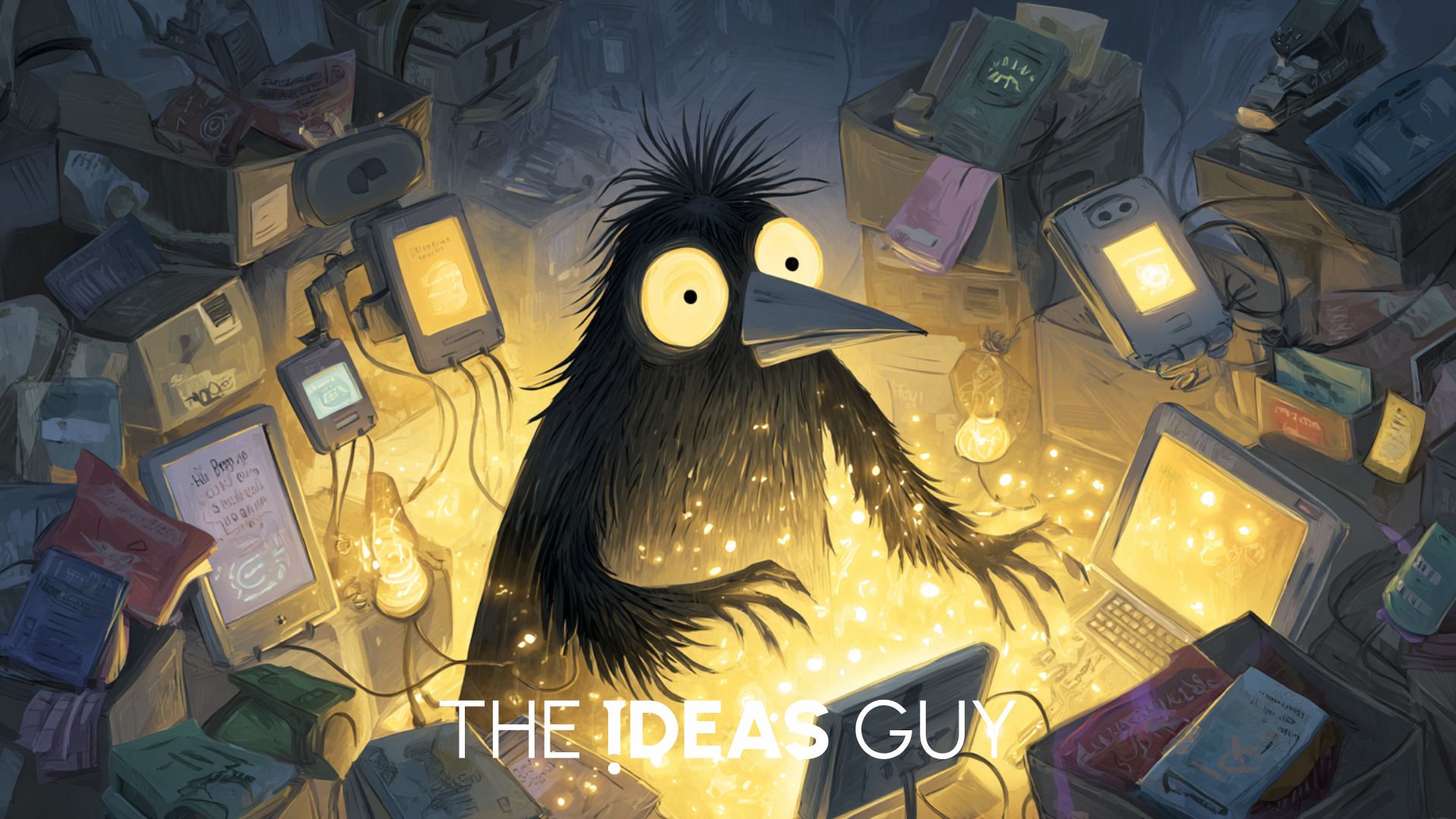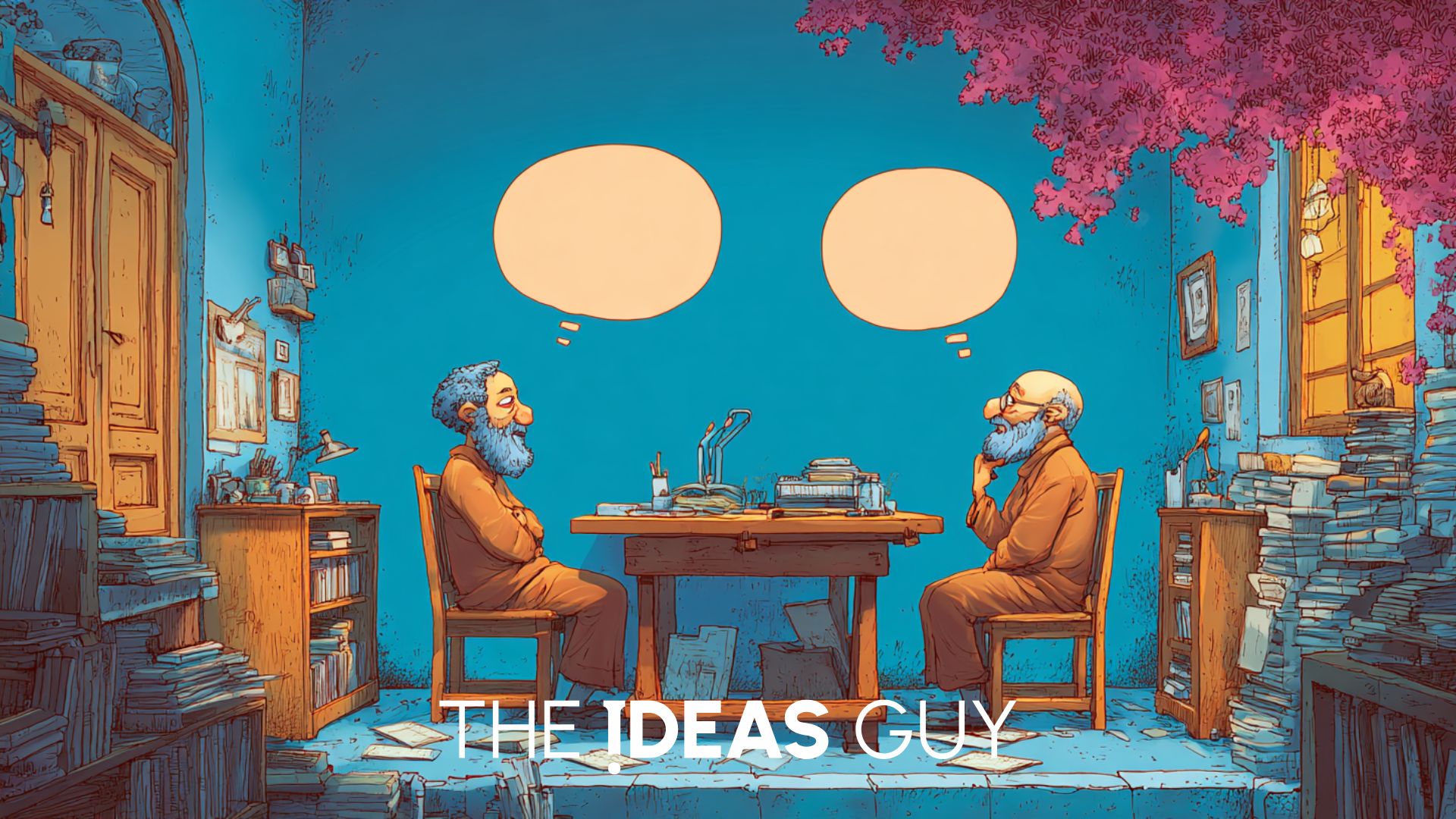"Ignorance killed the cat; curiosity was framed." When science fiction author C.J. Cherryh penned this twist on the familiar proverb, she struck at something profound. We've spent centuries telling ourselves that inquisitiveness leads to doom, when quite the opposite is true. It's the refusal to question that's been quietly doing us in all along.
Last weekend, I watched my youngest daughter learning the lyrics to yet another song in what seemed like minutes. She absorbs music like a sponge, while I'm still mumbling along to the same tunes I've heard for decades. Then she was off to the trampoline with her sister, determined to nail a back handspring she'd been working on. The sheer fearlessness of it – the willingness to fling herself backwards through the air, asking "what if" with her entire body – struck me. There was something gloriously untamed about her curiosity that made me realise how domesticated my own wondering has become.
When was the last time you approached something – anything – with that kind of raw, unbridled questioning? If you're like most of us, that instinct has been gradually muzzled by education, professionalisation and the quiet tyranny of expertise. We've been taught that respectable adults are supposed to know things, not question them. To have answers, not wonderings. The irony is bloody tragic.
I said as much in Dubai last week at the AI in Education Summit: education has become more about answering than asking questions.

From an evolutionary perspective, curiosity is what kept us alive. Our ancestors who wondered what lay beyond the next hill, who questioned whether that plant might be edible, who experimented with fire rather than fleeing from it – they're the ones whose genes we carry. Curiosity isn't some frivolous luxury; it's the survival mechanism that defined our species.
And yet here we are in 2025, drowning in information while simultaneously dying of thirst for genuine curiosity. We have more facts at our fingertips than any humans in history, but we're asking fewer real questions. We've become passive consumers rather than active explorers, content to scroll through the pre-packaged thoughts of others rather than formulating dangerous questions of our own.
This isn't merely a philosophical concern. It's an existential one. In a world of accelerating change and genuine uncertainty, the curious mind isn't just intellectually superior – it's strategically essential. The future belongs not to those who know the most, but to those who can question the best.
The Curious Brain, Unwashed
When curiosity sparks in your mind, your brain lights up like Blackpool Illuminations. Neuroscientists have observed that when we encounter novel, puzzling information – the kind that tickles our curiosity – activity spikes in the caudate nucleus, a region associated with reward anticipation. Put simply, our brains are wired to fancy a bit of intellectual adventure.
That's right – we get an actual dopamine hit from wondering. The same neurochemical that makes social media so addictive is released naturally when we ask good questions. Which means that curiosity feels bloody brilliant. Or at least it should. But like a muscle that atrophies without use, many of us have lost touch with this fundamental pleasure. We've traded the deep satisfaction of wondering for the shallow dopamine hits of scrolling.

The difference is crucial. Scrolling (or passive information consumption in any form) is fundamentally different from genuine curiosity. One is a mental sugar rush that leaves us feeling oddly empty; the other is nutritional brain food that builds neural connections and cognitive capacity. The former is what happens when you mindlessly flip through Instagram for an hour; the latter is what happens when you look at a starry sky and genuinely wonder what's out there.
"Curiosity is the tool that sparks creativity. Curiosity is the technique that gets to innovation." Brian Grazer
And here's what should give us pause: research shows that curiosity doesn't just make life more interesting – it literally keeps our brains alive longer. A number of studies found that maintaining curiosity into older age is associated with slower cognitive decline and greater resilience against dementia. Our wondering minds aren't just intellectually sharper; they're physically healthier.
The implications are profound. When we lose our curiosity, we're not just becoming duller company at the pub – we're actively accelerating our cognitive ageing. Every genuine question we ask isn't just expanding our understanding; it's creating new neural pathways that might just keep us mentally vibrant for decades longer.
Education: The Curiosity Killing Fields?
Walk into most primary school classrooms in Britain and you'll witness something both magical and tragic. Five-year-olds arrive bursting with questions – they ask between 100 and 300 per day according to research. By the time they're ten, that number has plummeted. By secondary school, most students have learned the grim lesson: questions are inefficient. Answers get marks. Curiosity is, at best, a luxury to be indulged after the "real work" is done.

Our education system (not the wonderful educators that work within it) doesn't just dampen curiosity – it systematically executes it with ruthless efficiency. The British obsession with assessment means we've created factories of certainty where the messy business of wondering is treated as a distraction from the main event: producing young people who can reliably regurgitate the right answers in the right order.
SATs, GCSEs, A-levels – the whole apparatus is designed to reward those who can predict what answers the examiner wants, not those who can ask questions the examiner hasn't considered. We've created an intellectual monoculture where the curious mind is a liability rather than an asset.
I think about a typical Year 11 GCSE history lesson. The teacher knows the questions that will likely appear on the exam and certainly the style of question and a rubric for the top marks. The students know the teacher knows. Everyone's engaged in an elaborate performance where ‘understanding history’ has been replaced by ‘memorising the specific interpretations this particular exam board rewards.’ Any student who asks a genuinely probing question that strays beyond these boundaries risks being gently but firmly guided back to what ‘matters’ – the prescribed content.
I'm not blaming teachers here – they're trapped in the same system, judged on results rather than on their ability to foster deep questioning. Many of them are engaged in a quiet rebellion, creating brief oases of genuine enquiry within the desert of standardisation. These teachers are the unsung heroes, keeping the flame of curiosity alive despite the system's best efforts to extinguish it. And I freakin’ salute them (that’s why I set up Edufuturists Awards for my Google Innovator Project in 2017.)
But the damage is real. By the time our young people enter university or the workforce, many have internalised the message that questioning is dangerous. Better to appear knowledgeable than curious. Better to have answers, even flimsy ones, than to dwell in the discomfort of not knowing. This isn't education; it's intellectual embalming.
The most painful irony? The future economy these young people are entering will value curiosity above almost all else. The jobs that can be done by following instructions are precisely the ones most vulnerable to automation. What will remain uniquely human is our capacity to ask new questions, to wonder "what if?" The very quality our education system systematically suppresses is the one they'll need most.
"Curiosity is the engine of achievement." Sir Ken Robinson

Corporate Curiosity Washout
If our schools strangle curiosity in its infancy, our workplaces finish the job with grim efficiency. British corporate culture (in fact, most workplaces around the world), but Britain with its peculiar blend of hierarchical deference and passive-aggressive politeness, creates the perfect environment for questioning to wither.
We've all sat through those meetings – the ones where a senior leader proudly announces, "There are no bad ideas here!" shortly before responding to a genuinely divergent suggestion with a tight smile and a "Yes, but..." The message couldn't be clearer if it were printed on company letterhead: curiosity is welcome, provided it leads to conclusions we've already endorsed.
Permission-based thinking has become such a fixture in our organisations that we barely notice it anymore. "Let me run this up the flagpole," "I'll need to get sign-off," "Let's stick to the approved process" – these phrases are organisational arsenic, slowly poisoning the questioning mind. They teach us that safety lies in conformity, not in exploration.
Consider what happens in most British businesses when someone asks, "Why do we do it this way?" The responses are depressingly predictable:
- "That's how we've always done it"
- "The procedure says so" (or computer says no)
- "That decision was made at a higher level"
- “It’s not broken so why mess with it”
- "Let's take that offline" (translation: let's never speak of this again)
All of which I heard in my last position in education. If you know, you know.
Each answer effectively communicates: your curiosity is inconvenient. Your questions disrupt our comfortable certainties. Your wondering makes us uncomfortable.
The tragic result is organisations full of people who have learned to self-censor their questions. Innovation becomes a sanitised, stage-managed process rather than the messy, questioning adventure it naturally is. Creativity is corralled into designated ‘brainstorming sessions’ that produce predictable results precisely because they occur within carefully policed boundaries of acceptable questioning.

Even companies that pride themselves on innovation often mistake idea volume for genuine curiosity. They count suggestions in their ideas schemes but fail to notice that these ideas remain safely within existing paradigms. True curiosity – the kind that asks whether the paradigm itself might be wrong – remains dangerous territory. (By the way, I am all for lots of ideas as per my spouting of Linus Pauling’s quote. I’m not for the amount being the measure of success.)
The Philosophical Roots of Wonder
The suppression of curiosity isn't a new phenomenon. In fact, the history of Western philosophy can be read as an ongoing battle between those who champion questioning and those who fear it.
Socrates was famously sentenced to death for corrupting the youth of Athens – a charge that amounted to encouraging them to question authority rather than accept it. His method – the elenchus or Socratic questioning – wasn't about providing knowledge but about dismantling false certainty. Socrates understood something profound: wisdom begins not with knowing but with acknowledging how little we know.
This tradition of philosophical questioning flows through the centuries, from Socrates to Descartes (with his method of systematic doubt) to Wittgenstein, who argued that the purpose of philosophy was to show the fly the way out of the bottle – to liberate us from the conceptual traps we've unwittingly constructed.
British empiricists like David Hume took sceptical questioning to new heights, challenging even our most basic assumptions about causality and the self. Hume's radical curiosity led him to conclusions that made even him uncomfortable, yet he followed his questioning mind wherever it led – a model of intellectual courage that feels increasingly rare.

What unites these thinkers is their refusal to settle for comfortable answers. They understood that curiosity isn't just about accumulating facts; it's about questioning frameworks, challenging assumptions, and embracing the discomfort of uncertainty. They knew that the most dangerous question isn't "What is this?" but "Why do we think about it this way?"
This philosophical curiosity differs fundamentally from what often passes for curiosity today. Trivia collection – the accumulation of disconnected facts – isn't curiosity but its counterfeit cousin. Real curiosity, the kind our philosophical forebears championed, involves questioning the questions themselves.
"I can live with doubt and uncertainty and not knowing. I think it is much more interesting to live not knowing than to have answers that might be wrong." Richard Feynman
History shows us that the most transformative figures were those who asked questions others didn't dare to. Darwin wondered why species seemed so well-adapted to their environments. Einstein pondered what a light beam would look like if you could ride alongside it. Turing asked whether machines could think. These weren't just clever people accumulating knowledge; they were radically curious minds who questioned the very frameworks of their fields.
Their curiosity wasn't safe or domesticated or contained within approved channels. It was wild, dangerous and transformative precisely because it challenged the foundations rather than the details.
Reclaiming Our Questioning Minds
So how do we reclaim our questioning minds in a world that seems designed to suppress them? How do we nurture authentic curiosity when every system – from education to employment – seems calibrated to reward certainty over exploration?
It’s one of the reasons I’m obsessed with asking great questions. 90% of my keynotes are about it, I littered them throughout my book and have two (soon to be FOUR 😉 sets of question cards as a key resource I sell).
The first step is breaking free from the prison of expertise. The more we identify as ‘experts’ in a field, the more threatening genuine curiosity becomes. Our professional identities become wrapped up in knowing rather than wondering, in having answers rather than questions. The antidote? Strategic naïveté – the deliberate adoption of a beginner's mind. This doesn't mean pretending to know less than you do. Rather, it means approaching familiar territory with fresh eyes. It means asking what the anthropologist Horace Miner called "the martian question" – if you were seeing this for the first time, with no preconceptions, what would you notice? What would puzzle you?
The second step is learning to ask questions that make people squirm – in a good way. Comfortable questions yield comfortable answers, which usually means maintaining the status quo. Transformative curiosity often feels uncomfortable precisely because it challenges implicit assumptions.
Some questions with this power might include:
- "What if the exact opposite were true?"
- "What are we deliberately not discussing here?"
- "What would we do if this constraint didn't exist?"
- "Whose perspective is missing from this conversation?"
These questions create discomfort because they expand the boundaries of what's being considered. They force us out of autopilot thinking and into genuine enquiry.
The third step is creating environments that actually reward not knowing. This is particularly challenging in British culture, where admitting ignorance often feels like admitting weakness. Yet the most curious organisations are precisely those where saying "I don't know, but I'm curious to find out" carries more status than pretending to have all the answers. Take Aardman Animations, the Bristol-based studio behind Wallace and Gromit. Their creative process deliberately incorporates ‘dumb questions’ – basic enquiries that might seem naive, but often lead to breakthrough thinking precisely because they haven't been constrained by expertise. This approach has helped them remain creatively vibrant for decades in an industry that quickly devours and discards talent.

Or consider the NHS Innovation Accelerator, which has adopted elements of ‘reverse mentoring’ where junior staff regularly question senior leaders about their assumptions and decision-making processes. This structured approach to questioning hierarchical thinking has led to significant improvements in patient care precisely because it legitimises curiosity from unexpected sources.
These organisations understand something crucial: curiosity isn't just an individual trait but a collective practice. It thrives in environments where questioning is valued and where the response to a challenging enquiry isn't defensiveness but genuine engagement.
"The illiterate of the 21st century will not be those who cannot read and write, but those who cannot learn, unlearn, and relearn." Alvin Toffler
Curiosity as Existential Armour
Beyond its professional and intellectual benefits, curiosity serves another vital function: it protects us against manipulation, propaganda and groupthink. In an age of information warfare and algorithmic filter bubbles, the questioning mind is our last and best defence.
We know how easily uncurious minds fall prey to conspiracy theories and extremist ideologies (seemingly more so now than ever but the 1930s, 1960s, 2010s may say differently to all the clickbaiters thinking Adolescence is the only thing that has messed young boys up!) These conspiracy belief systems offer something seductive: certainty. They provide simple answers to complex questions and clearly defined villains to blame for life's difficulties. They replace the discomfort of wondering with the comfort of knowing – even if what's ‘known’ is demonstrably false.
Genuine curiosity, by contrast, inoculates us against such manipulations. The curious mind asks: Why am I being told this? What evidence supports this claim? Who benefits from my believing this? What alternative explanations might exist? These questions aren't just intellectually rigorous; they're existentially protective. This connects directly to mental wellbeing. Research has found that curiosity is strongly associated with psychological resilience – the ability to bounce back from setbacks and navigate challenges. Curious people don't just know more; they suffer less when faced with life's inevitable difficulties.
The mechanism seems to be that curiosity helps us reframe challenges as interesting problems to explore rather than overwhelming threats. The curious mind asks, "What can I learn from this?" rather than simply "Why is this happening to me?" This shift in perspective doesn't eliminate suffering, but it transforms it from something merely endured to something potentially instructive.
In a world of accelerating change and genuine uncertainty, curiosity isn't just intellectually stimulating – it's emotionally essential. It allows us to navigate change through wonder rather than resistance, to approach the unknown with interest rather than fear.
Key Takeaways: Rekindling Your Dangerous Questioning Mind
So how do we cultivate this life-giving, mind-protecting curiosity in practical terms? Here are five approaches to rekindle your questioning mind:
1. Practise strategic ignorance. Deliberately put yourself in situations where you know less than everyone else in the room. Take up a new hobby, join a community with different expertise, or attend lectures on subjects outside your field. The discomfort you feel is the sensation of your curiosity reawakening.
2. Adopt the five whys. When faced with a problem or situation, ask "why?" five times in succession, going deeper with each iteration. This technique, developed in Toyota's manufacturing process, often reveals that what appeared to be the issue is merely a symptom of something more fundamental.
3. Create question rituals. End each day by writing down three questions that occurred to you. Don't answer them immediately. Let them simmer. Create space for wondering, without the pressure to immediately resolve the tension of not knowing.
4. Curate curiosity partnerships. Find people who wonder about different things than you do, and regularly exchange questions. The goal isn't to answer each other's questions but to expand the territory of your combined curiosity.
5. Embrace the phrase "I don't know." Practise saying it without immediately following it with "but..." Allow yourself to dwell in the uncertainty rather than rushing to resolution. Notice the discomfort this creates, and gradually learn to find pleasure in the open space of not knowing.
These practices won't just make you more interesting at dinner parties (though they will). They won't just make you more valuable professionally (though that's likely too). They'll do something far more important: they'll keep your mind alive in the fullest sense – engaged, growing and resistant to manipulation.
Curiosity may not have killed the cat after all, but its absence is certainly killing something vital in us: our capacity for wonder, for growth, for genuine intellectual and emotional resilience. In a world that increasingly rewards certainty and punishes questioning, the radical act is to keep wondering anyway. Our survival – intellectual, professional, and perhaps even spiritual – depends on it.
As the poet Rainer Maria Rilke advised:
"Be patient toward all that is unsolved in your heart and try to love the questions themselves... Do not now seek the answers, which cannot be given you because you would not be able to live them. And the point is, to live everything. Live the questions now." Rainer Maria Rilke
Further Reading
Discover more interesting articles here.
.png)



